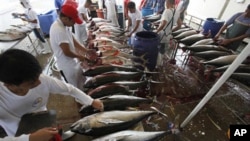Illegal, unreported and unregulated or IUU fishing, including “pirate fishing," poses serious problems to the world's marine environment, economy and food security. Scores of unmarked or inaccurately marked ships troll the world's oceans daily looking for a fast catch, and leaving devastation in their wake.
IUU fishing undermines efforts to conserve and manage shared fish stocks and threatens the sustainability of marine fisheries. By laundering their catch into the global seafood market, IUU fishing ships deprive legitimate fishermen and coastal communities of an estimated $10-23.5 billion worth of seafood and seafood products annually. In addition, illegal fishing operations are often intertwined with drug trafficking, labor exploitation, environmental degradation and organized crime. These activities threaten the livelihoods of law-abiding fishermen. Developing states that depend on fisheries for food security and export income are particularly vulnerable.
"With three billion people depending on seafood as their primary source of protein, we can no longer ignore activities that undermine access to nutritious sources of food," said Dr. Jane Lubchenco, head of the National Oceanic and Atmospheric Administration.
That is why the United States and the European Union are joining forces in efforts to crack down on this criminal practice. Early this month, Dr. Lubchenco, who is also Under Secretary of Commerce for Oceans and Atmosphere, signed an historic bilateral statement with Maria Damanaki, European Union Commissioner for Maritime Affairs and Fisheries, pledging their continued commitment to the fight against IUU fishing.
The statement emphasizes stronger bilateral cooperation on technical, operational and political levels. The U.S. and the E.U. will continue to support effective management measures in regional and international organizations to combat IUU fishing. They've also noted the importance of exchanging information on alleged IUU activities and promoting tools that prevent those who practice this crime from benefiting economically from their illegal actions.
Both the United States and the European Union already have laws in place that aim to combat IUU fishing and help keep illegal catches from entering their markets. Also, the U.S. has had great success in turning the corner toward ending overfishing and rebuilding stocks. Internationally, however, there is an increasing need for cooperation, especially among fishing and seafood-importing nations. While the most visible face of IUU fishing is typically unsupervised vessel fishing under a “flag of convenience”, IUU fishing occurs in every fishery, in every registry.
"International cooperation across oceans," said Dr. Lubchenco, "will help us maintain a level playing field for law-abiding fishermen by strengthening enforcement and preventing illegal fishing."
Cooperation Against Pirate Fishing

Illegal, unreported and unregulated or IUU fishing, including “pirate fishing," poses serious problems to the world's marine environment, economy and food security.















